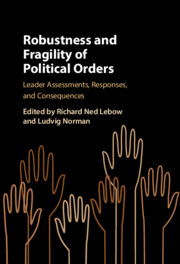Book contents
- Robustness and Fragility of Political Orders
- Robustness and Fragility of Political Orders
- Copyright page
- Contents
- Figures
- Contributors
- 1 Introduction
- 2 Robustness and Fragility of Political Orders
- 3 End of Democracy or Recurrent Conflict: Minimalist Democracy, Legitimacy Crisis, and Political Equality
- 4 Politics and the Administrative State
- 5 Roots in Common: The Fragility–Robustness of Democratic and Ecological Regimes
- 6 The End of Communist Rule in Europe: A Comparative Perspective on the Fragility and Robustness of Regimes
- 7 Democracy’s Fragility and the European Political Order
- 8 The American Fragility–Robustness Nexus
- 9 The Perils of Choice: Structure and Agency in EU Crisis Management
- 10 Conclusions
- Index
7 - Democracy’s Fragility and the European Political Order
Functionalism, Militant Democracy, and Crisis
Published online by Cambridge University Press: 25 November 2022
- Robustness and Fragility of Political Orders
- Robustness and Fragility of Political Orders
- Copyright page
- Contents
- Figures
- Contributors
- 1 Introduction
- 2 Robustness and Fragility of Political Orders
- 3 End of Democracy or Recurrent Conflict: Minimalist Democracy, Legitimacy Crisis, and Political Equality
- 4 Politics and the Administrative State
- 5 Roots in Common: The Fragility–Robustness of Democratic and Ecological Regimes
- 6 The End of Communist Rule in Europe: A Comparative Perspective on the Fragility and Robustness of Regimes
- 7 Democracy’s Fragility and the European Political Order
- 8 The American Fragility–Robustness Nexus
- 9 The Perils of Choice: Structure and Agency in EU Crisis Management
- 10 Conclusions
- Index
Summary
This chapter focuses on the origins of the institutions that would evolve into the European Union. Norman argues that a focus on perceptions of fragility provides a fruitful but underexplored perspective on the creation of the early institutions of European postwar political cooperation. The design of these institutions were informed by perceptions of fragility associated with democratic governance. The conventional functionalist story of the EU, where cooperative institutions were set up to prevent new conflicts between the formerly warring countries, while not inaccurate, obscures how the reconstruction of the European political order was also an answer to the breakdown of European democracy before the war. Notions of democracy’s fragility informed the functionalist perspective on politics as well as the perceived for a ‘militant’ protection of democratic institutions. Apart from shaping the origins of the European political order, the chapter argues that perceptions of fragility have continued to inform the institutional development of the EU and even ongoing efforts to strengthen its democratic aspects.
Keywords
- Type
- Chapter
- Information
- Robustness and Fragility of Political OrdersLeader Assessments, Responses, and Consequences, pp. 176 - 201Publisher: Cambridge University PressPrint publication year: 2022
- 1
- Cited by

